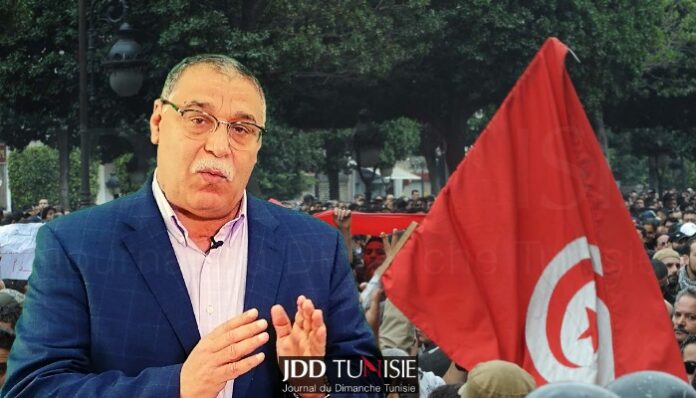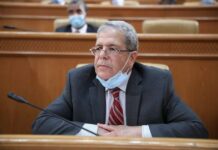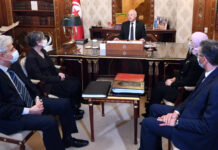By: Abdelhamid Jlassi
The crisis in Tunisia has worsened for more than a year and has taken on a complex character in which health, financial, economic, social, value and moral issues are mixed. The agreement was that the way to solve it is the political approach used to test the ability of the system resulting from the 2019 elections to coexist and operate in an efficient manner that responds to the most important messages of the voters, especially the desire for change and the demand for dignity.
Although the initiatives and attempts to gather the main parties around a dialogue table and set a road map to avoid collapse were numerous, they all failed due to the dominance of the mentality of domination and power struggle, the absence of a minimum level of trust and the tyranny of psychological considerations, until a mere meeting between the first officials in the state became an event for which platforms are set up and celebrated on Facebook pages.
Dozens of state-builders were “begging” for a ten-minute meeting to present a point of view and express their willingness to help resolve the situation, but they were only faced with complete silence.
The president expressed the position and its opposite from the national dialogue, and the country lost valuable time because of that, and relations between the various parties worsened.
It is important to recall two main conclusions that we reached during the past months in the midst of a flurry of analyzes and situations to stimulate memory:
First: The 2019 elections system has no choice other than the responsible coexistence on the basis of clarity in the program and powers, or the brave disengagement by acknowledging the inability to run the country and returning to the voters for a more efficient and stable system.
Second: The rotting situation is the responsibility of the entire 2019 election system, according to its weight and impact.
Light is now shed on the responsibility of Parliament, especially the first party in it, and it is a fundamental responsibility that we will not stop at, and we announced our positions on it with statements and in writing at the time.
However, the main responsibility of the President of the Republic, which was stipulated by a similar consensus for weeks, was covered due to his failure to represent all Tunisians, lead dialogues, bring points of view, arbitrate, and for other reasons related to his political and diplomatic performance, communication policy, methodology and work mechanisms (the composition of the Bureau, its stability and openness to the political, academic and media environment) and his attempt to involve the security and military institutions in the inter-scramble.
Getting to see the failure of the possibility of coexistence between Parliament/the government and the president was supposed to lead to the necessity of agreeing on premature elections after preparing the ground for this, but this option has also slowed down.
Therefore, everyone expected a complete collapse due to the aggravation of the crisis and tampering, or a widespread popular disorder that appeared in the movements of neighborhoods on the occasion of the anniversary of the revolution or a military intervention, which many wish, to stop the collapse and tampering.
The country needed a big shake after all the mess and all the time that was wasted. The measures announced by the Head of State on July 25 psychologically played this role, but it was morally and politically wrong, and it is dangerous in its consequences.
These measures are based on an original deception, as they hold the Parliament, the government and the parties responsible. Of course, they all bear a great responsibility, but on the other hand, the president, who did not fulfill his role and even invested in making the situation worse, was acquitted.
It is important for us to recall this fact in order to determine the appropriate political position. In addition, these measures represent a clear coup against the Constitution.
Perhaps I understand the underestimation of the gross violation of the text of the constitution, a violation that is still continuing, if the initiator was from outside the system, but I cannot understand that, since the initiator is the President of the Republic who could have saved the situation before it worsened.
I also cannot understand the appropriate description of measures that swallow the state and dissolve it in one individual. In violations of constitutions, it is not possible to distinguish between small and large.
It is clear that the popular mood in our region is haunted by the search for a savior, which is one of the main conclusions of the 2019 elections. However, sadly, the elite is also still haunted by the “just tyrant” theory, meaning that it does not absorb the lessons from dozens of experiences that confirmed the failure of betting on achieving development, unity or Palestine by neglecting the democratic contract.
Betting on a just tyrant means, in depth, acknowledging the inability to crystallize projects and visions and wage a broad public awareness battle. Rather, it replaces all this with a deceptive policy around and within power.
We repeat the same mistakes and “get bitten from the same burrow dozens of times”. Some forces in the late eighties imagined that they could utilize Ben Ali, whom they considered without a project. And now we can know who utilized whom and see if the country and the political culture have gained something from the spread the policies of opportunism and deception.
The policy of positioning and relying on the state in the face of the Ennahda has delayed the issue of democracy and left wounds in our social body from which we have not recovered so far.
Certainly, the Ennahda movement has committed many mistakes during the past decade, and I alerted to many of them when I was a leader in it and after my resignation from it. I hope that it will draw lessons from its political management and from the messages that were sent to it on July 25. Actually, not all opposition to the Ennahda is because of its identity, but rather a lot of it is political opposition on a national ground because of its practices, but on the other hand, I warn, with the same degree of clarity, that engaging in politics by merely antagonizing the Ennahda movement, questioning its right to exist, rejecting its legal activity and employing state agencies in this can threaten civil peace and curb serious reform efforts within it.
I know that many Democrats are now betting on a process accompanying the president’s actions, and therefore they are looking for guarantees and mitigating the violation of the constitution.
Unfortunately, I am not as optimistic as they are, and I am not certain of the correctness of their bet, for a simple reason, which is that the President of the Republic has a “project” consisting of dissolving Parliament gradually and trying to impose a constitution, and he has declared an alternative, so the story of the thirty days is nothing but a joke.
It is better for us to call things what they are, and to do what we must of peaceful political resistance than to cling to some illusions and then die in regret.
Some unruly actors affiliated with the president have already begun to terrorize the citizens in the neighborhoods, and self-censorship has returned in some pens, and the speech of incitement can push members of some agencies to transgress, and then things may get out of hand from all democrats.
The whole fear is that the masses, to whom hope has returned, will be deceived by a populist discourse that raises slogans and then fails to achieve, and then we may return again to the square of official repression.
Accordingly, I consider that the real solution and the shock that might get us out of the impasse, and the position that the president was supposed to take last Sunday, July 25, is to announce the failure of the entire 2019 system and prepare the country for a referendum on the constitution and then to premature presidential and legislative elections. That is the right response to diagnosing the situation and assuming the responsibilities and that is the closest response to ethics. In the meantime, Parliament must return to work. I know it is a bad parliament, but I did not learn to hand over my neck to anyone alone.
This is what the revolution taught me.
translated by BM jdd











